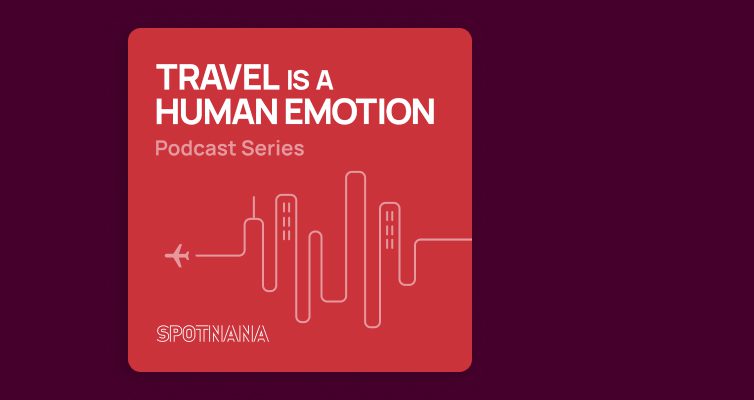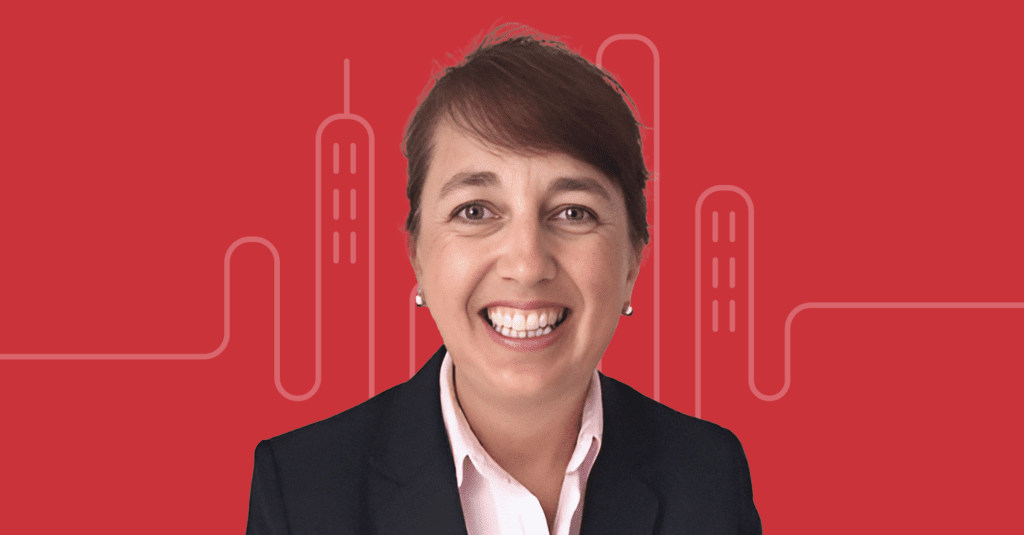Cisco’s Carlos Almendros on smarter business travel
Guest: Carlos Almendros, Global Procurement Service Leader (Travel), Cisco
Host: Johnny Thorsen, VP of Business Development for Content Distribution, Spotnana
Length: 23:36
Carlos Almendros joins Johnny Thorsen to discuss Cisco’s approach to improving traveler experiences and driving positive business travel outcomes.
Johnny Thorsen: Welcome to today’s podcast edition of the Spotnana podcast series that we are currently running. I’m very pleased to welcome Carlos Almendros, a long-time friend of mine from the global travel industry, but also the senior global procurement service leader for Cisco based in London and Carlos. Welcome to the conversation today.
Carlos Almendros: Hi Johnny.
Johnny Thorsen: If you don’t mind just giving a quick kind of background on your situation in Cisco and then we’ll look into the future but just to set the scene.
Carlos Almendros: Yeah, of course. So I’ve been at Cisco 21 years which is a long time I’ve been in and out of the travel category.
I came back about five, six years ago when the company asked me to work on an implementation of a new travel and expense solution, which at that time was SAP Concur. So it’s been about five, six years. I have a global team managing this category, which is located in about 93, 95 countries.
And I’m fully responsible for all of travel, card, and also more recently sourcing and procurement of internal meetings and events. Yeah, that’s a high level, Johnny, but feel free to ask me any additional questions.
Johnny Thorsen: Yep. So obviously you live inside a global technology leader, right, in their own business categories.
So obviously you’re exposed to new technology as a company. No doubt Cisco is known for acquiring a lot of companies to keep expanding and growing. So as you look into 2024 what kind of, what is your overarching goal or kind of a major objective for this year in the travel program?
Carlos Almendros: Yeah, I think the major goal is to continue to look at ways to innovate and transform this travel category. We’ve focused a lot and we’ll continue to focus as part of procurement, which is part of the finance organization to look at optimizing our spend. As you rightly highlighted, Cisco is a technology company.
We have some phenomenal collaboration capabilities. So when it comes to travel, we’ve driven a culture for many years now, where we ask our employees to be smart and to use business travel for the right reasons. That’s been really a driver within our culture for some time.
Since the pandemic we’ve opened up travel. We’ve enabled our teams to collaborate and get back together and we’re focusing a lot right now on enabling our sales organizations to meet with customers to continually drive growth for the company. But when it comes to where our focus is, the key priorities are innovation, sustainability, and really looking at, how do we strengthen our partnerships with our key strategic partners, our key strategic suppliers, because ultimately they’re the ones that will help us get through our journey, which is to drive an experience that is optimal.
At the end of the day, travel has changed immensely. When our employees conduct business travel, we want to look at how do we make that experience from the booking to the in trip and obviously the post trip, I think all of those elements as we all know, travel tends to be a little bit behind when it comes to, making that, that capability in that easy.
Johnny Thorsen: Yep. You said the words, so I’m going to jump on that for a moment. Sustainability. A lot of companies, I would say over the last few years have at least introduced measurements. So they’re starting to monitor and get a constant better idea of the carbon emissions from their program and other kinds of sustainability aspects.
Have you reached the point in Cisco where you have an active travel policy around sustainability, meaning destinations where you cannot fly to or airlines you cannot fly with for sustainability reasons. How advanced are you today?
Carlos Almendros: Yeah. We’re not that advanced in terms of, limiting, restricting suppliers per se.
What we have done is we’ve driven a more, smarter way of conducting business travel. So one day business trips are generally not recommended, and we’ve seen, less than 3% of our business trips are 1 day business trips. We’re looking at ways to encourage rail travel more where it’s feasible, probably more in Europe than it is in the U.S., although we do look at the side of the U.S. where, maybe Amtrak could be a better option.
When it comes to sustainability, first and foremost, if you speak to a number of people in Cisco, it’s do not travel unless it’s required. And the reality is, and even our leadership appreciates the value that business travel brings. It really is just truly important but things like direct flights, we strongly recommend people look at direct flights versus the indirect flights when it comes to our car program. We’ve implemented and allowed vehicles to be booked and we do have rideshare agreements, which we also encourage people to look at the green options, which are now available through some of the larger ride share programs.
When it comes to education, awareness we try to leverage the technology we have in terms of improvements around pop-up messaging again. It’s not state of the art. It’s not innovative, but it’s how do we make our travelers look at different ways of conducting their business that might be more sustainable.
Lastly, what I would say is just to echo what you mentioned, which is we spent the last two years really creating that foundation reporting, making sure we were measuring those key categories in Cisco are scope-3 business travel emissions are really quite a small percentage. Unlike many of my peers, where it may be a bigger challenge for them, we do see the Cisco program being a small percentage of scope-three, but we also know that the perception is much greater. Cisco does much greater things when it looks at reducing its scope 1, 2, and 3 efforts in different parts of the organization. So I wanted to be really clear that, although this is really important to us, we continue to look at how technology will evolve, it’s still a small portion of our footprint when it comes to scope-3, which is something we have to balance. You can imagine there’s bigger parts of the pie that the company will want to address first.
Johnny Thorsen: Yep. Yep. And that’s exactly one of the hard realities, right? That in some companies, business travel accounts for a significant part of total emissions in others. It is a small area and therefore money is better spent in other areas. Hard reality of life, right? But thanks for sharing that insight on Cisco and sustainability. Looking at the travel industry, one of the things that I would say really accelerated last year in terms of change was content and content fragmentation.
How are you thinking about getting access to the right content in your program going forward? Are you in a good place or are you still planning or where do you stand there?
Carlos Almendros: Firstly, it’s probably important to hear what I see as our content strategy and that is, what does that really mean for us?
A system means enabling all content at the front for our travelers. Not just air content, hotel, rail content. It really means any content that is out there. How do we bring that to the forefront of our travelers? I mentioned earlier content, it’s limited. It’s challenging. We still have those issues.
We still have those challenges. So the Nirvana would be to have that capability at the front as our travelers are booking. So we are continually evaluating. Both what we’re doing inside Cisco and obviously continuing to look at the new entrants who aren’t new entrants anymore, they’ve been around for two or three years, just like yourself.
So I think, we really want to do something over the next 12 months where we start to look at, it could be low-cost airline content, which is becoming interesting and how the carriers are removing that through the aggregators. It could be some of the major carriers that are really changing their strategies, their strategies in order for us to optimize our spend to get the most value out of our corporate agreements.
They’re offering direct channels that are really quite challenging for us today. So we’re not where we want to be. We’re continuing to evaluate what tools and technologies are out there. And I’ve said this numerous times that I think. It’s like a jigsaw puzzle.
It’s your own online booking tool. It’s your TMC. And then it’s obviously the historical legacy global distribution systems. We don’t care where the content comes from, Johnny. We really don’t. And I think that’s what is really important for all of our strategic partners to understand is we absolutely want to give the traveler the best experience, the best content.
How that gets done should not be dependent on one channel. Like a GDS. That’s the key here. And as I continue to look at how we innovate and transform our program, the key message here is that we want to be able to enable content to come through different channels. And that’s what we’re driving, our partners to, to enable and to allow us to do that.
We all know that it’s not as seamless as we’d like it to be today, but that’s my overview strategy on content. We want all of it, want. From any channel, and we want to make it available to our end users. And so that’s what my team and my technology group and even our own IT team, we want the experience to be optimal at the moment.
There are some challenges there.
Johnny Thorsen: And, credit to you, right? For at least having made that clear decision that getting access to all content is a key part of your future program, which of course then will probably lead to some changes in one or more areas. But content is one thing that’s what you put in front of your travelers.
Then as you mentioned at the beginning, right? Then there’s the, what happens during the trip? And of course, eventually, how do they settle after the trip? So what are your thoughts around servicing a trip? Is that something you see your TMC continue to provide services for? Are you looking at completely new kinds of external trip capabilities?
Any thoughts there?
Carlos Almendros:We did a voice of the traveler probably in the early part of 2023 and we found that booking travel is a small piece of the journey. It really is. And we all get so hung up on having the best tool, the best solution, which I still think is really important.
You’ve got to make it efficient. You’ve got to make it productive quicker. But where we saw most of our noise is this journey experience. It’s, I’m going to be traveling and I don’t know all the value adds and benefits that I could be getting before I get on that trip. I also want to see, maybe, the right restaurants.
I want to stay in the right properties that are close to where I’m meeting with my customers. That information is not readily available. And that’s where we were seeing most of the noise. And the pain point is they want to be able to do their booking and then maybe spend more of their time determining.
During that business trip where can they see the benefits, whether it’s, improvements on the hotel rooms, whether it’s restaurants that are popular within the organization or places that would be, things that I would like. So how do you tie the profile?
We talk about personalization, which hasn’t gone away. I think that the key is how do you personalize that whole experience, but it’s the trip itself that they get there, they conduct their business, they get back and then they find out they could have had all these added. Added benefits that weren’t made available to them either during the pre booking or just prior to them actually getting there.
I think that’s the bit that is really frustrating for the end users and for us as well as buyers, because we’re investing our time with our suppliers to negotiate and really improve our optimal discounts, but also value adds. What else can we give our travelers? And that’s the bit that I think we need to resolve is how do you bring that so it’s not just those elements.
What about health? What about passports and visas? We’re in a new environment where well being is top, top of our priorities. How do we make sure that our travelers, when they’re conducting business, that they still have that ability to continue their well-being activities that they may be doing back at home?
So I think those are things that we want to bring into the whole journey. Now you asked a question, do I expect my TMC to be delivering those activities? I think a lot of buyers would say, absolutely. But the reality is there’s so much information out there. We haven’t touched on AI. We haven’t touched on generative AI.
And I think those are the, figuring out that Johnny, figuring out how do we get that information, the right information to our end users so that they can take advantage of these value adds that they’re. They’re losing out on today.
Johnny Thorsen: And hey you said it, right? AI is the final segment I had prepared for having a little chat about, right?
Because it holds the key to potentially solving a lot of problems, but it’s also all about, do we have good enough data to create credible AI capabilities in travel? And starting with something, I’m calling it traveler grouping or cohorting. Have you started to identify groups or personas of travelers across the Cisco program, or are you still looking at people by their corporate level in the organization?
How do you group travelers today?
Carlos Almendros: Yeah, I think we definitely haven’t probably invested a specific amount of time on grouping travelers, but if you ask me we look at some of the tools we’re using in our organization today. So we have the ability to use some of the collaboration Webex tools creating Webex spaces. And so what we found with those is your frequent travelers, those that are conducting at least a minimum of what, 10 trips a year. Those are the ones that we get a lot more constructive feedback around tools, processes, policies. So I think we’ve already got a group there, which consists of all different levels.
So we don’t really look at that hierarchy level as we may have done in the past, I think it’s really got to be those that are using the services that are leveraging the tools and working through the processes. I think that’s probably the audience that we leverage in many ways when we’re trying to gain feedback, whether it’s through the services that we provide to them, or whether it’s a technology that we’ve deployed.
I think those are things that we’re looking at in terms of looking at the right audience. So it is a form of grouping, but we haven’t gone out of our way to do that. We’ve just created an environment that enables those individuals to actually provide more meaningful feedback.
And then, in addition to that we have our analytics and our insights that provide us a lot of good data around who’s traveling, where they’re traveling, which country they’re traveling from, and all of that stuff is valuable to us. But again, I think we need to look at a set number of trips as opposed to the occasional traveler who probably has different demands, but there is a demand that occasional travelers may need more insight, knowledge of where they’re going, whereas the regular traveler probably has a lot of answers already.
Johnny Thorsen: Yep. No. And you almost said it right. It’s obvious that somebody going to Paris for the first time should have a different flow of information than somebody going there for the 20th time over a two-year period. In today’s travel infrastructure, we don’t have that ability. Everyone is getting the same every time, right?
Everyone is treated like you have never been there before. So it’s great for the first-time visitor. Even though they feel they get too little information and it’s annoying for the frequent visitor who thinks, I know all this, don’t bother me. So that’s why I think the ability to analyze travelers in new ways And then communicate the right information based on what the analysis says that’s a big opportunity
Carlos Almendros: Yeah Johnny, I think we want to drive, I mentioned it at the beginning, you know I’m looking to innovate and transform the program, but at the same time we want the workflows and the process to be efficient and to be relevant.
So how do you identify those travelers that need more information versus those that are, frequent travelers that they’re gonna not require that. And I think with all the capabilities that we’re seeing around us in different sectors, not travel specific. I think that’s not far away from us having that ability to tie specific information to the specific audience that you want.
It’s got to be key and that will drive efficiencies of the greater experience. And remember, this isn’t their full-time job booking the business trip and traveling for business travel is a component, which enables them to be more productive, drive growth, et cetera. Our goal is to make that experience efficient, best as it can be.
And I think technology is going to play a pivotal part as we go forward for sure.
Johnny Thorsen: So looking at AI is there one area or a few areas that stand out for you as the biggest opportunity or biggest potential for improvement or are you completely open minded on how AI can come in and play here.
Carlos Almendros: Yeah, I think when I think of AI, I think there’s probably lots of areas that I feel I had little notes here. So I want to look at my notes here. I think we’re all learning, where this can play an important part. And I think some of us are using some of this AI in some of these chatbots that are available, but I think we are trying to create an environment and figure out, you said it earlier, the data and the information has to be correct.
And that’s the biggest concern is where’s that information being collected? What are we actually providing to the travelers? Every individual probably has a unique experience or unique ask. You’ve got the different groups, as you mentioned, road warriors, non-road warriors, et cetera. But so I think when we look at AI for us, it’s about first of all, identifying where we feel that could really drive efficiencies into the workflow or the booking process. I think that’s the area that we are sitting down and figuring out, let’s look at that traveler’s journey and let’s look at the pain points.
We’ve already identified the pain point being during trips. So if you ask me where we want to try to drive some of that intelligent information, it’s probably during the business trip, what information is readily already there that could enhance the traveler experience during the trip, because we know that’s the piece that we’re hearing travelers are missing out on a lot of valuable information, even from health and being and things like that, Johnny, at the moment, it’s so fragmented, I’m having to go to various different places.
Yeah. And you know what’s happening today, travelers are just going on to the GPT app or these chat apps and they’re just typing the question and getting a whole world of information. But again, it’s disrupting the experience. It’s disrupting the journey. But again, it’s becoming the norm. We’re all doing it in our daily lives.
We’re all looking at these great apps that give us answers quickly. How do we bring that into that journey? So that’s where we are. We’re not mature enough to say anything more than that.
Johnny Thorsen: As usual, you and I can talk for forever about these topics, right? And we have seen changes come and go, but I think first of all, we’re running out of time.
Thanks a lot, Carlos for joining us and sharing your thoughts. And I would say for those who are going to listen, it is interesting to hear your approach, right? You’ve decided you want all the content available. That’s part of your strategy. And then you want to focus on using AI for improving the trip experience.
And that’s two very clear objectives for you to go after. And it then will probably set the stage for whatever technology you end up working with as running your program. But thanks a lot for sharing. I really appreciate you giving us the time today. Thanks a lot, Carlos.
Carlos Almendros: Excellent.
Thank you, Johnny. And I appreciate it. Like you say, it’s always good chatting and this is an interesting space for sure.






